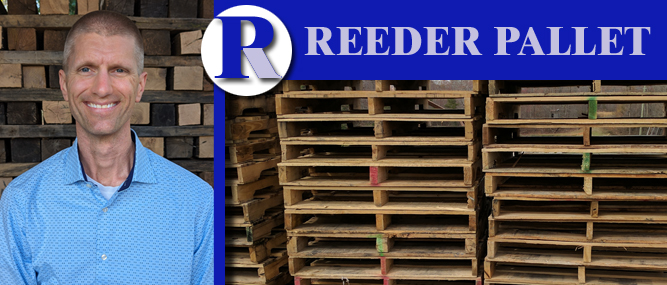Matthew Reeder is the owner of Reeder Pallet, a second-generation pallet recycling business in Seagrove, North Carolina. Formed in July of 1989, Reeder Pallet focuses on repairing and remanufacturing pallets and serves businesses throughout North Carolina.
Pallet Enterprise: What is the best piece of business advice that you have ever received?
Reeder: There are two nuggets of truth I try to keep in mind when leading. First, never sacrifice a long-term goal or relationship for a short-term win. This guided the way we navigated pricing to our customers during the pandemic. We chose to keep our pricing below the market to help our customers, and we are blessed that we haven’t lost any customers as pallet pricing has over-corrected. Our approach improved our relationships with our customers. The second truth is simply, ‘Do the next thing.’ Don’t put off or avoid what is best for the business, even if it is uncomfortable.
Pallet Enterprise: Have you recently started pursuing any new markets/product lines?
Reeder: Like every other pallet recycler right now, we’re sitting on a large inventory of B grade pallets, and we have taken this opportunity to explore ways to convert these to A grade. Our goal is to find a process that will profitably convert 10 to 30% of our B pallets. It’s a work in progress, but has been a fantastic way to engage our workforce around a problem and seek a solution together.
Pallet Enterprise: What is one thing you do at your company that is different from other pallet companies?
Reeder: As a smaller recycling business with some creative minds, we can come up with some crazy ideas to try. One idea that has stuck has been to run loads that are heavier in unnail (cut apart) through the unnailers first rather than down the repair line. The unnail operators will cut off the broken boards of repairable pallets, saving our pallet repairmen the struggle of removing boards and hammering the nails. It saves about 20 seconds per pallet on the repair table, and it is much easier work for the repairmen.
Pallet Enterprise: What is one of the hardest business decisions you have ever made?
Reeder: We’re currently making that decision now. At the end of 2020, we purchased land to build a new facility and are now on the cusp of breaking ground for the building. Looking at the largest inventory I’ve seen in a while, with a potential recession looming, we’re struggling to determine if now is the right time to build.
Pallet Enterprise: What is the most important lesson you’ve learned about customer service?
Reeder: Customer service is not about giving the customer what they want because the customer is not always right. Rather, good customer service is an authentic relationship that continually builds trust. A customer who trusts that you have their best interests at heart is the best defense when the competition knocks on their door.
Pallet Enterprise: What performance indicators do you track to measure how your company is doing?
Reeder: There are the ones we all look at: daily production, profitability per grade and per customer, etc. But, while this may sound sappy, I also want to gauge sentiment. Are my workers smiling when they talk with me? Was the interaction with a customer a positive one, even if it addressed a problem? If our interactions are failing, then the numbers aren’t sustainable.
Pallet Enterprise: What is one thing you wish you knew a long time ago that could have helped your company along the way?
Reeder: My father started the business when I was 12, and I literally grew up working in pallets. After college, when I came back to work for Reeder Pallet full time, I took business culture for granted and spent way too much time studying numbers, conducting time studies and tweaking our production processes. A pastor once said that God’s currency is people. As I’ve grown as a leader, I’ve learned that when you take care of the culture and the people, all of the other details tend to fall in line much easier.





